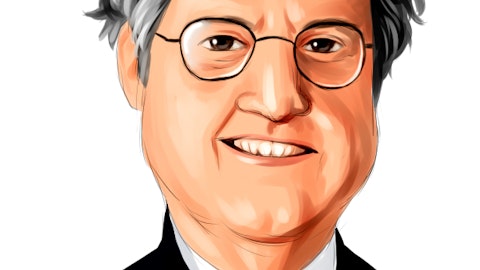In this article, we discuss the 12 best artificial intelligence stocks to invest in right now. If you want to read our detailed analysis of these stocks, go directly to the 12 Best Artificial Intelligence Stocks To Invest In Right Now.
5. Apple Inc. (NASDAQ:AAPL)
Number of Hedge Fund Holders: 127
Apple Inc. (NASDAQ:AAPL) ranks 5th on the list of 12 best artificial intelligence stocks to invest in right now. The tech giant based in California is one of the leaders in the AI world with significant features such as FaceID, Handwriting recognition, Translate App, Sound recognition, and App Library suggestion integrated on its iOS, macOS, iPadOS, and watchOS.
Apple Inc. (NASDAQ:AAPL) has been investing heavily into tech startups. One of the most recent purchases of Apple Inc. (NASDAQ:AAPL) is AI startup Xnora.ai in 2020. Xnora.ai specializes in putting artificial intelligence on devices. Shares of AAPL rose 31% over the last twelve months.
On July 29th, Keybanc analyst Weston Twigg raised the price target of Apple Inc. (NASDAQ:AAPL) to $105 per share from $100 per share and kept his Overweight rating on the stock.
The company has a market cap of $2.42 trillion. In the fiscal third quarter of 2021, Apple Inc. (NASDAQ:AAPL) reported an EPS of $1.30, beating estimates by $0.30. In the third quarter, the company reported a revenue of $81.40 billion, up 36% year-over-year and beating revenue estimates by $8.47 billion.
At the end of the first quarter of 2021, 127 hedge funds in the database of Insider Monkey held stakes worth $130.9 billion in Apple Inc. (NASDAQ:AAPL).
ClearBridge Investments mentioned Apple Inc. (NASDAQ:AAPL) in its Q1 2021 investor letter:
“As we actively manage holdings and position sizes, we look to regularly recycle capital into more compelling opportunities. Maintaining our valuation discipline, we sharply reduced our position in Apple, whose shares more than doubled following our initial purchase in mid-2019 with an earnings multiple rising from the low-to-mid teens to nearly 30x.”
4. Alphabet Inc. (NASDAQ:GOOGL)
Number of Hedge Fund Holders: 185
Alphabet Inc. (NASDAQ:GOOGL) ranks 4th on the list of 12 best artificial intelligence stocks to invest in right now. The California-based multinational tech giant utilizes AI in Google’s search engine, Google’s Ads and Doubleclick, Google Maps, Gmail, Google Drive, Google Calendar, Google Translate, among others.
Alphabet Inc. (NASDAQ:GOOGL) acquired over 30 AI startups since 2009 including PittPatt, DeepMind, Onward, and AppSheet. One of the most recent acquisitions of the company was the smartwatch company Fitbit. Alphabet Inc. (NASDAQ:GOOGL) has soared 81% in the twelve months.
On July 29th, Argus analyst Joseph Bonner raised the price target of Alphabet Inc. (NASDAQ:GOOGL) from $2,800 per share to $3,100 per share and kept his Buy rating on the stock. The analyst highlighted GOOGL’s notable second-quarter results.
The company has a market cap of $1.81 trillion. In the second quarter of 2021, Alphabet Inc. (NASDAQ:GOOGL) reported an EPS of $27.26, beating estimates by $8.05. The company’s second-quarter revenue came in at $61.88 billion, beating revenue estimates of $56.02 billion. Shares of Alphabet Inc. (NASDAQ:GOOGL) increased 54% in the year-to-date.
There were 185 hedge funds that reported owning stakes in Alphabet Inc. (NASDAQ:GOOGL) at the end of the first quarter. The total value of these stakes at the end of Q1 is $24.57 billion.
Baillie Gifford mentioned Alphabet Inc. (NASDAQ:GOOGL) in its Q2 2021 investor letter:
“Whilst several sources of upside remain, namely in the cloud business, hardware, and YouTube subscriptions, we have waning conviction in Alphabet‘s ‘moonshot’ bets (such as Waymo), substantial success in which would likely be required to produce a 5x return from here. Given the reduction in our assessment of the probability-adjusted upside, and with strong competition for capital in the portfolio, we therefore sold the Alphabet holding.”
3. Amazon.com, Inc. (NASDAQ:AMZN)
Number of Hedge Fund Holders: 243
Amazon.com, Inc. (NASDAQ:AMZN) ranks 3rd on the list of 12 best artificial intelligence stocks to invest in right now. The Washington-based multinational technology company specializes in e-commerce, digital streaming, and artificial intelligence. The company was founded in 1994 and operates its cloud computing business through its AI-powered Amazon Web Services (AWS).
Amazon Web Services (AWS) sales accounted for 12.5% of the overall revenue for Amazon.com, Inc. (NASDAQ:AMZN) in the quarter ended April 2021, totaling $13.5 billion, a 32% increase year-over-year.
Earlier this year, the company acquired communication tech firm Wickr. The collaboration allowed its users to enjoy additional security features across messaging, phone and video chatting, file sharing, and collaboration.
The company has a market cap of $1.69 trillion. In the second quarter of 2021, Amazon.com, Inc. (NASDAQ:AMZN) reported an EPS of $15.12, beating consensus estimates by $2.9. The company’s second-quarter revenue came in at $113.1 billion, an 27% increase year-over-year. Shares of AMZN jumped 5% over the last twelve months.
There were 243 hedge funds that reported owning stakes in Amazon.com, Inc. (NASDAQ:AMZN) at the end of the first quarter. The total value of these stakes at the end of Q1 is $50.42 billion.
Argosy Investors mentioned Amazon.com, Inc. (NASDAQ:AMZN) in its Q2 2021 investor letter:
“So how are our largest holdings affected in a world of higher wage inflation? As a general rule, I will evaluate current and potential future holdings on their capital intensivity and their ability to raise prices. Amazon is now (a part of) our top 5 largest equity holdings. Amazon is a more complex story. Their AWS business is largely a similar story to Facebook. Their first-party retail business is very asset-and labor-intensive given their extensive warehousing footprint. I think Amazon would have more pricing power than any other player, and despite being one of the largest employers in the US, bricks-and-mortar retail is likely still more asset- and labor-intensive than Amazon’s ecommerce footprint. With all that said, overall Amazon’s first-party business would be adversely impacted by inflation, but the combination of Amazon’s AWS and advertising business should provide fairly robust inflation protection.”
2. Microsoft Corporation (NASDAQ:MSFT)
Number of Hedge Fund Holders: 251
Microsoft Corporation (NASDAQ:MSFT) ranks 2nd on the list of 12 best artificial intelligence stocks to invest in right now. The Washington-based tech giant produces software, electronics, and computers, among others. Microsoft Corporation (NASDAQ:MSFT) also operates its AI-powered technology through Azure AI services and GitHub.
Microsoft Corporation’s (NASDAQ:MSFT) AI for Earth is one of the company’s recent AI investments. AI for Earth is a five-year program that funds projects that use cutting-edge technology to solve environmental problems. Over 137 individuals and organizations in 47 countries have already benefited from the program.
In April, Microsoft Corporation (NASDAQ:MSFT) announced a $19.7 billion deal to acquire speech recognition and AI service provider Nuance. MSFT’s presence in the AI in the health care market will be boosted as a result of this acquisition. Shares of Microsoft Corporation (NASDAQ:MSFT) jumped 14% in the last three months.
On July 28th, BMO Capital analyst Keith Bachman raised the price target of Microsoft Corporation (NASDAQ:MSFT) to $325 per share from $290 per share and kept his Outperform rating on the stock. According to the analyst, The company’s fiscal fourth-quarter results were a positive move with margins above his expectations.
The company has a market cap of $2.18 trillion and offers a dividend yield of 0.77%. The company’s fiscal fourth-quarter EPS came in at $2.17, beating consensus estimates by $0.27. Microsoft Corporation (NASDAQ:MSFT) reported revenue in the fiscal fourth quarter of 2021 was $46.15 billion, a 21% increase year-over-year, beating consensus estimates of $44.1 billion. Shares of Microsoft Corporation (NASDAQ:MSFT) increased 30% year to date.
By the end of the first quarter of 2021, 551 hedge funds out of the 866 tracked by Insider Monkey held stakes in Microsoft Corporation (NASDAQ:MSFT), worth roughly $58.9 billion.
1. Facebook, Inc. (NASDAQ:FB)
Number of Hedge Fund Holders: 257
Topping the list of 12 best artificial intelligence stocks to invest in right now is American energy company Facebook, Inc. (NASDAQ:FB). The social media platform Facebook has over 2.89 billion active users.
Facebook, Inc. (NASDAQ:FB) recently developed its AI system DeepFace. Deepface is an AI-powered platform that assists users in recognizing people in photographs and tag people they know. Another AI-powered platform that Facebook developed is the Facebook translation feature which allows users to stay more connected by translating posts that appear on their newsfeed.
On July 29th, Truist analyst Youssef Squali raised the price target of Facebook, Inc. (NASDAQ:FB) to $425 per share from $400 per share and kept his Buy rating on the stock, highlighting the company’s strong Q2 results driven by the growth of higher advertising prices amid macroeconomic improvements and continued strength in commerce.
Facebook, Inc. (NASDAQ:FB) has a market cap of $1.02 trillion. In the second quarter of 2021, Facebook, Inc. (NASDAQ:FB) reported an EPS of $3.61, beating estimates by $0.59. The company’s second-quarter revenue came in at $29.08 billion, beating consensus estimates of $27.82 billion. Shares of FB increased 25% in the last twelve months.
At the end of the first quarter of 2021, 257 hedge funds in the database of Insider Monkey held stakes worth $40.96 billion in Facebook, Inc. (NASDAQ:FB).
SaltLight Capital Management mentioned Facebook, Inc. (NASDAQ:FB) in its Q2 2021 investor letter:
“At SaltLight, we’re giddy with excitement when we uncover businesses that the market has not “discovered” yet. Our composure also weakens when we find a business that is ‘hiding in plain sight’ and market participants are underestimating the duration of a moat or under-appreciating a strategic shift into a new business (our heart skipped a beat with Transaction Capital’s recent acquisition of WeBuyCars).
Whilst an investment in Facebook is unlikely to win awards for being original, we must remind ourselves that our job is to find durable and indispensable businesses that have great odds in creating long term returns for investors who trust us with their hard-earned capital. We cannot think of a better company than Facebook.
Our incongruous path to working on Facebook came after exploring Southeast Asian and Japanese B2C companies (a story for another day). In discussions with these businesses, the common challenge confronting them is acquiring new customers (particularly during the COVID period). Facebook and Google kept coming up as the most effective way for targeting new customers. This spicy insight was the indispensability that we were looking for.
The share price was unreconcilable to the implied value over the next 3–5 years and, optionality that exists with new initiatives. The decision to deploy capital became rather easy.
Critics will argue that Facebook has a deep market penetration already (almost half the world’s population of 3.5bn monthly active users across Facebook, Instagram and WhatsApp) and an obvious question to ask is – how much juice is left?
Our view is that the growth of users is less important; monetising the strong network effects across its platforms and the balancing act of capturing value vs. facilitating value is the more important question for future returns.
Our broad thesis rests on (1) moving down the transaction stack, (2) monetising WhatsApp, (3) enhancing discovery and (4) the optionality around the “next consumer platform”.
Regulatory challenges will always be a potential headwind. The impact of Apple’s changes to IOS (App Tracking Transparency) is still unknown. However, the question to also ask is: what’s in the price. Our letter is on what we think is not in the price.
The Advertising Engine
First, it is helpful to give a brief overview of the current profit engine. Digital advertising has essentially democratised ad buying – from blue chips right down to SMEs and increased the surface area of targeting high-propensity-to-buy customers. The true genius of the online advertising model is:
• Long-tail of potential customers: The potential ad inventory is so much larger (e.g., women in their 20s within a 10km radius who are away from home)
than the inventory from a print magazine or TV commercial slot (e.g. the ten LSM categories)
• Quantitative measurement of ROI: Advertisers can measure the performance of ad spend at a very granular level vs. the ‘spend and pray’ approach to traditional advertising. Facebook makes it simple and affordable to reach customers that a business truly wants. Much of Facebook’s revenue comes from direct response advertising such as joining a list, buying a product, visiting a store, or installing an app.
Their advertising distribution base (from blue-chip companies to SMEs) combined with advanced algorithms fed with data from 3.5 bn users creates an incredibly durable moat. This 2020 survey2 demonstrates how effective social commerce on Facebook is compared to other platforms. Despite its rapid adoption, TikTok still trails behind Facebook platforms considerably.
Readers will recall that, across its platforms, Facebook shows a targeted ad (figure 1 show that their ad targeting is impeccably tuned to our interests), and the user clicks the ad to which they jump onto another site.
Once on the seller’s site, the user’s experience varies greatly and is highly dependent on the seller’s technical sophistication. For SME’s, this is not their
core competence. And for buyers, painfully, they need to keep entering their credit card details for each new website (with the associated risk of fraud with each new entry)
Over the last year, management has been strategically developing products to move up (discovery) and down (checkout and payments) the eCommerce stack.
In 2020, Instagram shops were launched where a user can purchase directly via an Instagram account. The only part of the transaction left for the merchant is shipping.
These features have taken off considerably in one year. As of June 2021, they already had 300 million monthly Shops visitors and over 1.2 million monthly active Shops.
Monetising WhatsApp
Our thesis over the next few years is that WhatsApp will be increasingly monetised (Zuckerberg is playing the long game after buying it back in 2014!) and will be an integral part of the Facebook/Instagram shopping architecture.
At this stage, WhatsApp is virtually unmonetised and therefore is not meaningfully appearing in the income statement (and valuation multiples).
Since we have invested, the pace of monetisation of WhatsApp is gaining steam.
• Consumer to business interactions over chat.
• Payments from WhatsApp are already available in Brazil and India.
• Shopping directly on WhatsApp
Monetisation here is likely to still be predominantly ad revenue, however, management is disclosing a 5% take rate on GMV4 on its Facebook marketplace and shops products. This is likely to carry across to the WhatsApp store.”
You can also take a peek at 10 Finance Stocks That Pay Dividends and 10 High Yield Monthly Dividend Stocks to Buy in August.





